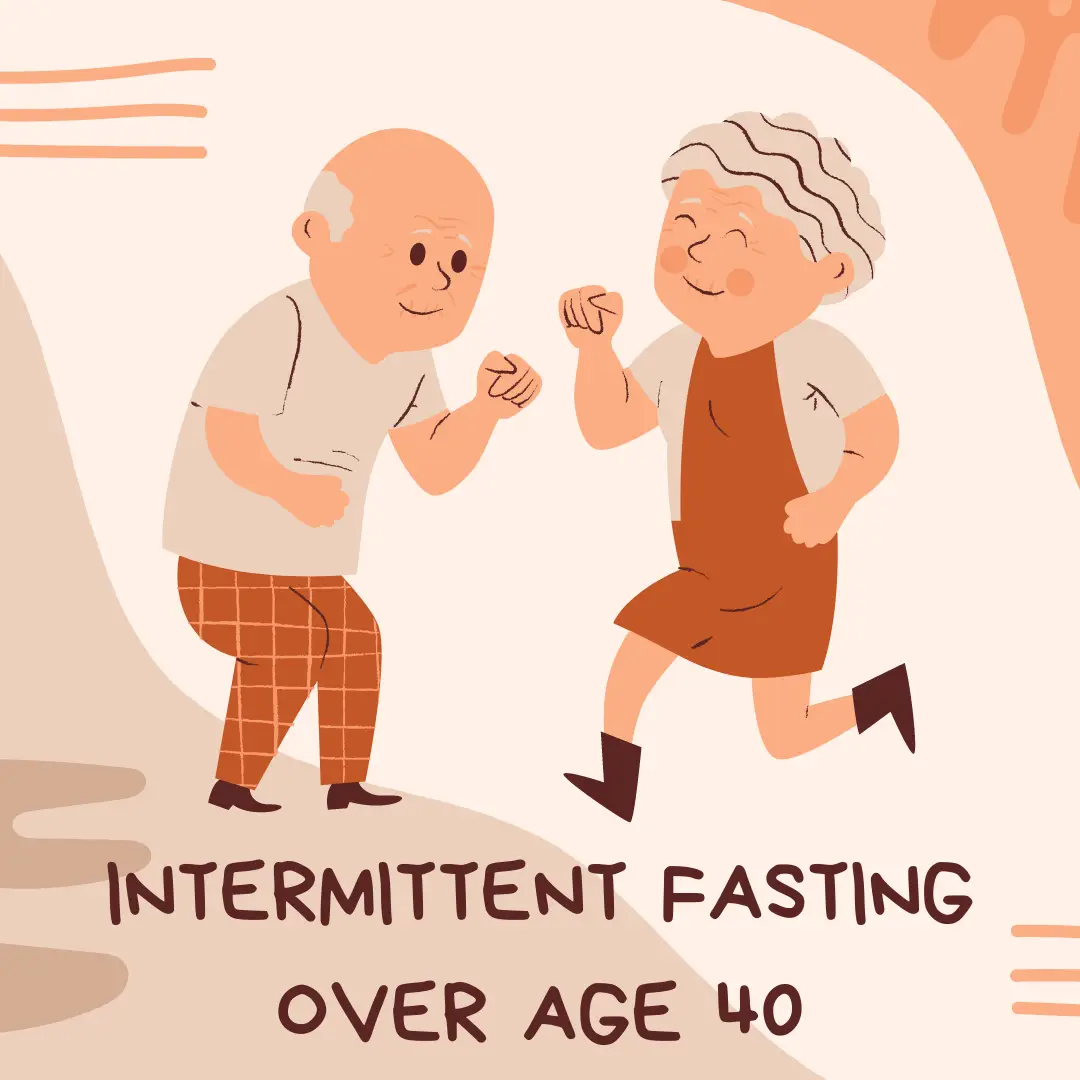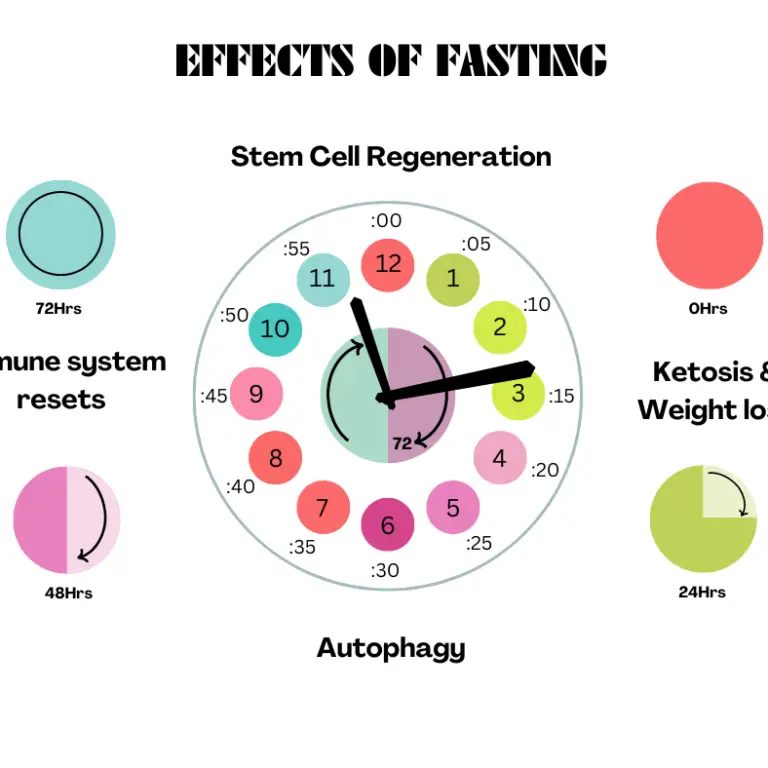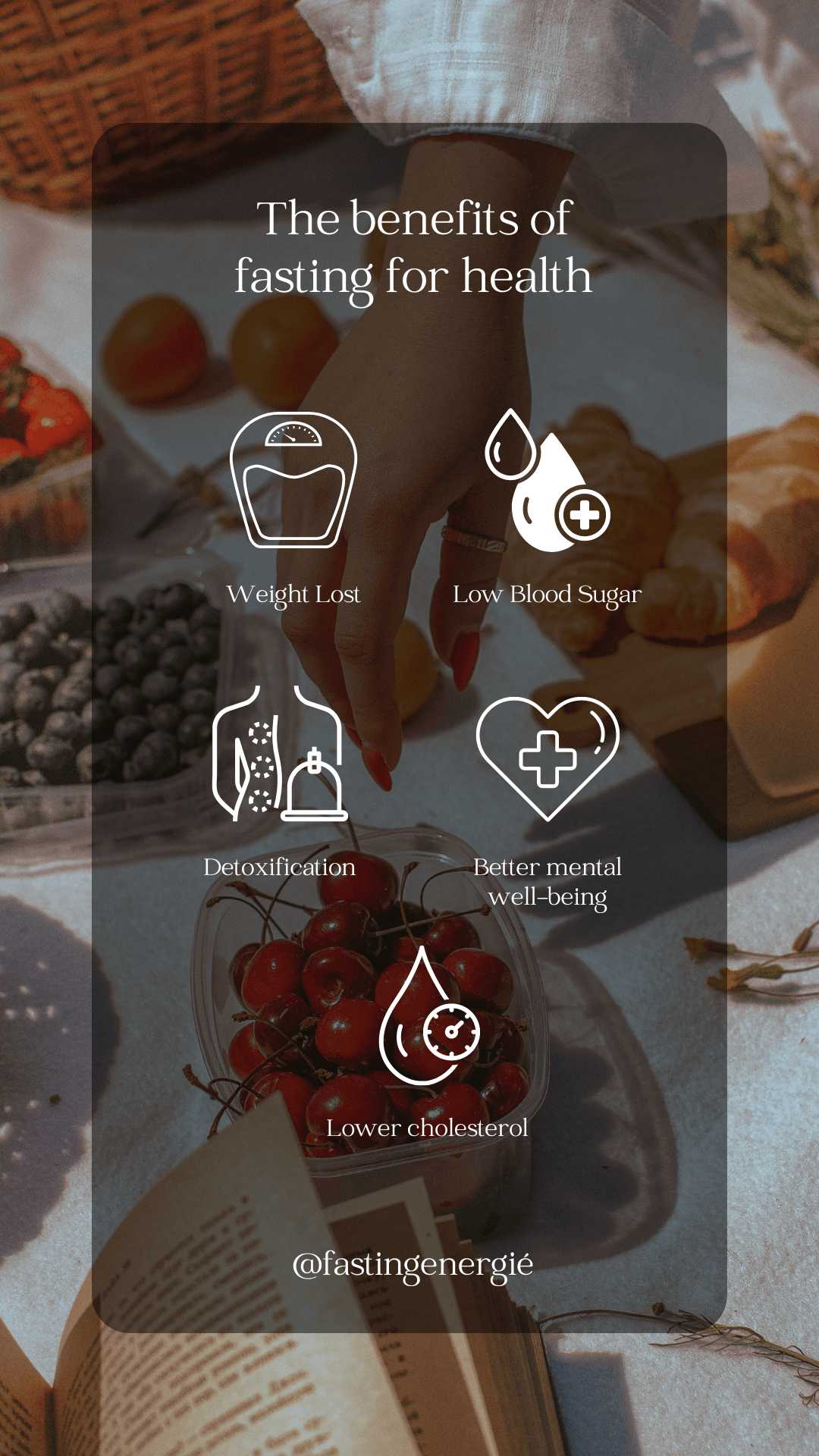Intermittent Fasting Over Age 40: Unlock the Age-Defying Secrets with Our Complete Guide!
Have you been hearing the buzz about intermittent fasting (IF) and wondering if it’s something that could benefit you, especially now that you’ve hit the big 40? Intermittent Fasting Over the Age of 40 for Men and Women. Let’s delve into this fascinating topic, tailored just for those in this fabulous age bracket.
Intermittent Fasting Over Age 40
Table of Contents

Why Should You Consider Intermittent Fasting After Age 40?
As people age, their metabolic rates reduce, hormone levels fluctuate, and the risk of age-related disorders rises. Intermittent fasting can help mitigate some of these age-related changes by inducing physiological responses that enhance health and vigour. After the age of 40, many people begin to gain weight, lose energy, and are at a higher risk of developing metabolic and chronic diseases. Intermittent fasting can help control these difficulties through a variety of processes, making it an appealing option for people looking to stay healthy into their middle years and beyond.
Benefits of Intermittent Fasting for People Over 40
Enhanced Metabolic Health
Intermittent fasting can enhance metabolic health by increasing insulin sensitivity, lowering blood sugar levels, and decreasing the chance of developing type 2 diabetes. These advantages are especially noteworthy beyond the age of 40, because insulin resistance tends to rise with age.
Enhanced Hormonal Balance
Fasting affects important hormones that govern metabolism, including insulin, human growth hormone (HGH), and norepinephrine. These hormonal changes can assist to retain muscle mass, reduce fat storage, and enhance overall energy utilization—all of which generally deteriorate with age.
Enhanced Longevity and Disease Prevention
According to research, intermittent fasting can help you live longer and lower your risk of diseases including Alzheimer’s, heart disease, and cancer. These advantages are thought to be the result of increased cellular repair processes, decreased oxidative stress, and greater metabolic health.
Weight management
One of the most obvious benefits of intermittent fasting is its ability to aid with weight management. Intermittent fasting naturally reduces calorie consumption and helps balance the hormones involved in hunger and satiety, both of which can become dysregulated as one gets older.
Enhanced Cellular Repair and Autophagy.
Autophagy is the body’s process of removing damaged cells in order to regenerate newer, healthier ones. Intermittent fasting promotes autophagy, which is essential for avoiding age-related deterioration and disease. Improved autophagy is associated with better cellular function and longevity.
Enhanced cognitive function
Fasting has been demonstrated to increase brain health and cognitive function, which may lower the risk of neurodegenerative illnesses. It enhances the synthesis of brain-derived neurotrophic factor (BDNF), a protein that promotes neuronal development and protects against cognitive loss.
Increased Physical Energy and Vitality
Many people report feeling more energised and lively after intermittent fasting. This can be related to more stable blood sugar levels, less inflammation, and a more effective metabolism.
improved digestive health
Intermittent fasting allows the digestive tract to rest during fasting times, which can help improve gut health and alleviate gastrointestinal distress symptoms such as bloating, cramps, and indigestion.
Enhanced Sleep Patterns
Fasting can improve sleep by affecting circadian cycles, resulting in more consistent sleep patterns. Some research suggests that intermittent fasting can improve sleep quality, resulting in deeper and more restful sleep.
Reduced Inflammation
Chronic inflammation is associated with a variety of age-related illnesses. Intermittent fasting has been proven to lower inflammation indicators, potentially improving general health and lowering the risk of chronic diseases.
Specific Considerations for Ages 40 and Beyond
Changes in Metabolism after 40
As people age, their metabolism naturally slows down, which can start as early as their mid-30s. This slower metabolic rate means the body burns less calories at rest, making weight management more difficult. Intermittent fasting can help mitigate this loss by enhancing metabolic flexibility (the capacity to easily switch between burning carbs and fats), which can aid in the maintenance of a healthy weight and metabolism.
Hormonal Adjustments in Middle Age
Middle age causes major hormonal changes in both men and women. Men may see slow reductions in testosterone levels, which impact muscular mass, libido, and energy levels. Women enter perimenopause and menopause, with changes in oestrogen and progesterone causing symptoms such as hot flashes, mood swings, and increasing belly fat. Intermittent fasting can assist manage hormonal shifts by boosting insulin sensitivity and human growth hormone levels, so mitigating some of the harmful impacts of hormonal variations.
Nutritional Needs of Ageing Bodies
As the body ages, its nutritional requirements alter. There is an increased demand for minerals that promote bone health, such as calcium and vitamin D, as well as antioxidants that counteract oxidative stress, such as vitamins C and E. Protein requirements may also rise to assist offset age-related muscle loss. Intermittent fasting should be scheduled to guarantee appropriate consumption of these essential nutrients during eating windows, with nutrient-dense foods taking precedence to meet the body’s demands without adding unnecessary calories.
Women Over 40.
Special Challenges Faced by Women of This Age Group
Women over 40 frequently confront the combined difficulty of managing weight gain caused by a slower metabolism while also dealing with the hormonal upheavals of perimenopause and menopause. These changes can have an impact on both physical and emotional health, emphasising the importance of proper weight management and hormonal balance techniques.
How Intermittent Fasting Can Help Menopausal Symptoms
Intermittent fasting may assist to alleviate menopausal symptoms by stabilising weight and improving hormone control. Fasting increases insulin sensitivity and reduces inflammation, which may help with menopausal symptoms like hot flashes and night sweats. Furthermore, weight loss by fasting can lower the severity of these symptoms because adipose tissue contributes to oestrogen production, affecting hormonal balance during menopause.
Adapting Fasting Strategies to Promote Hormonal Health
For women over 40, especially those going through perimenopause or menopause, it is critical to customise fasting tactics to their hormonal demands. This could entail shortening fasting patterns or aligning fasting days with the body’s natural rhythms to reduce stress and promote hormonal balance. Consulting with healthcare experts to monitor hormone levels and change dietary intake as needed can maximise the benefits of intermittent fasting while minimising potential disruptions or negative effects on hormonal health.
Common Challenges and Ways to Overcome Them
Controlling Hunger and Energy Levels
One of the most difficult aspects of intermittent fasting, particularly for beginners, is managing hunger and energy levels. This can be especially noticeable in people over 40, who may also be experiencing metabolic slowdowns.
- Overcoming Hunger: Include high-fiber foods like vegetables, fruits, legumes, and whole grains in your meals to boost fullness. Protein-rich foods might also help you feel fuller longer. Drinking enough of water or herbal teas while fasting might also help to keep hunger at bay.
- Maintaining Energy: Match your complex carbohydrate intake to your activity level. Consuming complex carbohydrates during your meal window can help you maintain a constant release of energy and minimise energy dips.
How to Balance Fasting With Family and Social Life
Fasting regimens can sometimes disrupt routine family meals or social gatherings, which can be difficult to manage.
- Flexibility: Be adaptable with your fasting schedule to accommodate special events. Intermittent fasting can frequently be modified (e.g., adjusting fasting windows) to better accommodate social activities without jeopardising your success.
- communication: Explain your fasting practice to family and friends to gain their support and understanding, which will make balancing these factors much easier.
Adjusting Exercise Routines for Better Results
workout is an important part of a healthy lifestyle, especially for people over 40, but fasting may necessitate changes to your workout programme to maintain performance.
- Timing Workouts: Schedule more intensive workouts close to your eating times, particularly after you’ve eaten, to capitalise on enhanced energy levels. Lighter activities, such as yoga or walking, can be done while fasting.
- Type of Exercise: Strength exercise is recommended for maintaining muscle mass and improving bone density, which is especially important for older persons. Combine this with cardiovascular activities to improve heart health and joint flexibility.
Strategies for Successful Intermittent Fasting After 40
Choosing the Proper Fasting Schedule
Finding a routine that works for your lifestyle, energy demands, and health goals is essential for long-term fasting success.
- Personalisation: Experiment with several fasting regimens (e.g., 16/8, 5:2, or alternate-day fasting) to see which feels most sustainable based on your daily activities and how your body responds.
Advice for Meal Planning and Nutrient Intake
To compensate for the lower eating frequency, make sure you eat nutrient-dense meals throughout your eating windows.
- Nutrient Density: Select meals high in vitamins, minerals, antioxidants, and fibre. To cover all nutritional bases, prioritise a balanced macronutrient intake, including healthy fats, proteins, and complex carbohydrates.
- Meal Planning: Plan your meals ahead of time to avoid making impulsive eating selections while hungry. This helps you stick to your nutritional goals without worry.
The Importance of Hydration and Electrolytes
Staying hydrated is critical, especially when fasting, because it helps control appetite, maintain energy levels, and support metabolic activities.
- Hydration: Aim for at least 8-10 glasses of water each day. Increase your consumption if you exercise or live in a hot climate.
- Electrolytes: If you sweat a lot during long fasts or after strong workouts, consider taking an electrolyte supplement or eating electrolyte-rich foods like coconut water.
Medical Considerations and Safety Measures
Health Screenings Before Begin
Before beginning an intermittent fasting routine, especially for people over 40, it is critical to get full health examinations. These exams can assist discover any underlying illnesses that may be impacted by dietary and eating patterns changes, such as diabetes, hypertension, or heart disease.
- Recommended Screenings: Check blood glucose, cholesterol, blood pressure, and hormone levels. These baseline measurements will be valuable for tracking progress and altering the fasting schedule as necessary.
Monitoring health changes and making appropriate adjustments
As you advance with intermittent fasting, it is critical to continuously assess your health state to ensure that the dietary approach is beneficial to you and has no negative side effects.
- Regular Check-ups: Make regular appointments with your healthcare practitioner to evaluate health metrics and address any symptoms or concerns.
- Self-monitoring: Keep a log of your bodily reactions to fasting, such as energy levels, mental clarity, hunger levels, and any new health issues that appear.
When to Consult a Healthcare Provider
Knowing when to seek expert support will help you avoid potential health problems and ensure that intermittent fasting is done properly.
- Consultation Triggers include significant weight loss or increase, chronic exhaustion, dizziness, or any other unusual physical or mental health problems. If you have pre-existing conditions, you should have regular consultations to adapt your fasting schedule in response to changes in your health.
Success Stories & Testimonials
Real-life Experiences of People Over 40
Many persons over 40 who have attempted intermittent fasting report a variety of benefits, including weight loss and increased energy, as well as improved management of chronic health concerns. These testimonials can be motivating and provide insights into the practical aspects of incorporating fasting into daily life.
- Shared Experiences: Stories frequently emphasise the necessity of consistency, the difficulties encountered, and the tactics employed to overcome them, providing significant lessons for newcomers.
Lessons Learned and Inspiring Results
Testimonials not only inspire, but also educate others about the potential difficulties and crucial solutions for successful intermittent fasting.
- Common Lessons: The value of a supportive environment, determining the best fasting window for one’s lifestyle, and the crucial role of remaining hydrated and maintaining a balanced diet throughout eating periods.
Adapting Intermittent Fasting to a Long-Term Lifestyle
Sustainable Longevity Practices
Adopting intermittent fasting as a permanent habit involves more than just a temporary shift in eating habits; it must be smoothly integrated into your lifestyle so that it benefits your long-term health and well-being.
- Gradual Integration: Begin with less aggressive fasting patterns and progressively ramp up the intensity as your body adjusts. This helps to keep the practice manageable and sustainable.
- Consistency is Key: Maintaining a regular fasting schedule allows your body to acclimatise and settle into a rhythm, making the practice a natural part of your daily routine.
How to Combine Fasting with Other Healthy Habits
Intermittent fasting is most successful when combined with other health-promoting habits.
- Balanced Diet: Make sure your meals are nutrient-dense, with a range of whole foods to provide all of the important vitamins and minerals.
- Regular Exercise: Combine cardiovascular, strength, and flexibility activities to enhance the health benefits of fasting.
- Adequate Sleep: Getting enough sleep helps the healing processes that fasting promotes.
- Stress Management: Techniques like meditation, yoga, and even basic breathing exercises can help to maximise the advantages of intermittent fasting.
Expert Opinions and Advice.
Perspectives from Nutritionists and Gerontologists
Nutritionists and gerontologists frequently emphasise the significance of customising fasting protocols for individual health problems, particularly when metabolic rates and nutritional requirements alter with age.
- Personalised Nutrition Plans: Professionals can assist in developing eating plans that target specific dietary demands, ensuring that you receive appropriate macro and micronutrients during your eating windows.
Professional Recommendations for Elderly People
Medical and fitness specialists typically advise older persons to embrace intermittent fasting under supervision, particularly those with chronic conditions or who are taking medication.
- Regular Monitoring: Regular health screenings to assess the impact of intermittent fasting on different aspects of health, including heart health, bone density, and cognitive function.
Conclusion
Recap of Benefits and Challenges
Intermittent fasting has various advantages for people over 40, including better metabolic health, hormonal balance, and enhanced longevity. However, it also brings issues such as hunger management, energy maintenance, and nutritional adequacy.
My Final Thoughts on Making Intermittent Fasting Work After 40
To successfully include intermittent fasting into your post-40 lifestyle, you must first assess your specific health, lifestyle, and nutritional requirements. It is critical to approach fasting with flexibility and patience, prepared to change your regimen as your body responds. Consulting with healthcare specialists to personalise the fasting approach to your unique circumstances can help maximise benefits while minimising hazards, allowing you to continue this beneficial practice for years.
Frequently Asked Questions
How Many Hours Should a 40-Year-Old Fast?
For someone who is 40, a moderate fasting window of 12-16 hours is generally recommended. This range is manageable and can provide health benefits without overly stressing the body.
Is Intermittent Fasting Bad for Perimenopause?
Intermittent fasting isn’t inherently bad for perimenopause but should be approached cautiously. Hormonal fluctuations during this period can affect energy levels and metabolism. A shorter fasting window (e.g., 12-14 hours) may be more appropriate to ensure hormonal balance and manage symptoms.
Does Intermittent Fasting Work for Over 40?
Yes, intermittent fasting can be effective for individuals over 40. It may help improve metabolic health, increase fat loss, and enhance longevity. However, individuals should consider their overall health, activity level, and dietary needs when planning their fasting strategy.
Is Intermittent Fasting Good for a 50-Year-Old Woman?
Intermittent fasting can be beneficial for a 50-year-old woman, particularly for managing weight, improving insulin sensitivity, and potentially enhancing heart health. Starting with a less stringent fasting schedule, such as 12-14 hours, can help ease into the practice safely.
How Many Hours Should a 50-Year-Old Intermittent Fast?
A fasting window of about 12-14 hours is often ideal for 50-year-olds. This duration supports health benefits while minimizing potential stress or negative impacts on sleep and hormonal balance.
Should a 60-Year-Old Do Intermittent Fasting?
A 60-year-old can practice intermittent fasting, but it’s important to prioritize a balanced diet rich in nutrients during eating windows and to consult with healthcare providers to tailor the fasting plan to any existing health conditions.
Does Intermittent Fasting Work for Menopause Belly?
Intermittent fasting can help reduce abdominal fat, commonly referred to as u0022menopause belly,u0022 by improving overall metabolic health and facilitating fat loss. Combining intermittent fasting with a balanced diet and regular physical activity can be particularly effective.







